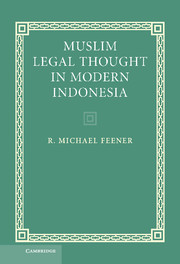Book contents
- Frontmatter
- Contents
- Acknowledgments
- A note on transliteration
- List of abbreviations
- Preface: Toward an intellectual history of modern Indonesian Islam
- 1 Technology, training, and cultural transformation
- 2 The open gate of ijtihād
- 3 An “Indonesian madhhab”
- 4 Sharī ʿa Islam in a Pancasila nation
- 5 New Muslim intellectuals and the “re-actualization” of Islam
- 6 The new ‘ulamā’
- 7 Next generation fiqh?
- Conclusion
- Bibliography
- Index
Preface: Toward an intellectual history of modern Indonesian Islam
Published online by Cambridge University Press: 29 September 2009
- Frontmatter
- Contents
- Acknowledgments
- A note on transliteration
- List of abbreviations
- Preface: Toward an intellectual history of modern Indonesian Islam
- 1 Technology, training, and cultural transformation
- 2 The open gate of ijtihād
- 3 An “Indonesian madhhab”
- 4 Sharī ʿa Islam in a Pancasila nation
- 5 New Muslim intellectuals and the “re-actualization” of Islam
- 6 The new ‘ulamā’
- 7 Next generation fiqh?
- Conclusion
- Bibliography
- Index
Summary
Over the past century, Muslim thinkers in the Indonesian archipelago have cultivated remarkable capacities for innovative work by integrating diverse strands of modern Muslim thought from around the world into communication with ideas developed in Europe, North America, and elsewhere by non-Muslim thinkers. In bookstalls surrounding the campus of the National Islamic University (Universitas Islam Negeri/ UIN) at Ciputat in South Jakarta, one can find not only classical Arabic fiqh texts and works by modern Middle Eastern authors, but also vernacular translations of Freud, Gramsci, and Foucault alongside hundreds of original Indonesian works that creatively engage with various combinations of these materials. Nowhere else in the Muslim world that I know of presents this kind of cosmopolitanism to such an extent. It is impossible, for example, to find Arabic translations of the Indonesian works of Hazairin on bilateral inheritance or Sahal Mahfudh’ on “Social Fiqh” in Cairo. On the other hand, it is relatively easy to obtain Indonesian translations and discussions of the work of Muslim scholars from the Middle East and beyond, such as Ḥasan Ḥanafī (Egypt), Mohamed Arkoun (France), Muḥammad ʿĀbid Jābirī (Morocco), AbdolKarim Shoroush (Iran), Khaled Abou El Fadl (US), Farid Esack (South Africa), and Nasr Abu-Zayd (the Netherlands), not to mention dozens of publications by non-Muslim scholars of Islamic Studies, and thinkers in other fields ranging from cultural anthropology to critical studies – all in an afternoon's browsing through bookshops in Jakarta or Yogya.
- Type
- Chapter
- Information
- Muslim Legal Thought in Modern Indonesia , pp. xvii - xxPublisher: Cambridge University PressPrint publication year: 2007

